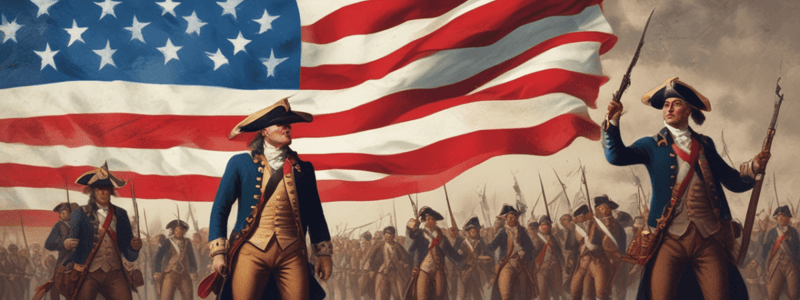Podcast
Questions and Answers
When was the Declaration of Independence adopted by the Continental Congress?
When was the Declaration of Independence adopted by the Continental Congress?
- July 4, 1776 (correct)
- June 17, 1775
- September 19, 1777
- July 4, 1775
Who was among the committee of five that wrote the Declaration of Independence?
Who was among the committee of five that wrote the Declaration of Independence?
- Paul Revere
- George Washington
- Robert Livingston (correct)
- John Hancock
What was the significance of the Battle of Saratoga?
What was the significance of the Battle of Saratoga?
- It convinced France to ally with the Americans. (correct)
- It led to the eventual British recognition of American independence.
- It was the first battle of the American Revolution.
- It was a British victory in South Carolina.
What was the outcome of the Battle of Bunker Hill?
What was the outcome of the Battle of Bunker Hill?
What was the significance of the Battle of Yorktown?
What was the significance of the Battle of Yorktown?
What influenced the writing of the Declaration of Independence?
What influenced the writing of the Declaration of Independence?
What was the main purpose of the Preamble in the Declaration of Independence?
What was the main purpose of the Preamble in the Declaration of Independence?
What was the outcome of the Battle of Camden?
What was the outcome of the Battle of Camden?
Flashcards are hidden until you start studying
Study Notes
Declaration of Independence
- Adopted by the Continental Congress on July 4, 1776
- Written by a committee of five: Thomas Jefferson, John Adams, Benjamin Franklin, Robert Livingston, and Roger Sherman
- Declared the 13 American colonies' independence from Great Britain and established the United States of America as a sovereign nation
- Based on the principles of liberty, democracy, and individual rights
- Influenced by the Enlightenment thinkers, such as John Locke and Jean-Jacques Rousseau
- Consists of three main parts:
- Preamble: introduction to the document and its purpose
- List of Grievances: enumeration of the colonies' complaints against King George III
- Declaration of Natural Rights: assertion of the colonies' right to revolt and establish a new government
Major Battles
Early Battles (1775-1777)
- Battle of Lexington and Concord (April 19, 1775): first battle of the American Revolution, fought in Massachusetts
- Battle of Bunker Hill (June 17, 1775): fought in Boston, Massachusetts; although the British won, they suffered heavy casualties
- Battle of Saratoga (September 19-October 7, 1777): decisive American victory in New York, convincing France to ally with the Americans
Mid-War Battles (1778-1780)
- Battle of Monmouth (June 28, 1778): fought in New Jersey, resulting in a tactical draw
- Battle of Camden (August 16, 1780): British victory in South Carolina, but American forces rebounded under General Nathanael Greene
Turning Point and Final Battles (1781-1783)
- Battle of Yorktown (September 28-October 19, 1781): American and French forces trapped and forced the British surrender, leading to the eventual British recognition of American independence
- Battle of Cowpens (January 17, 1781): American victory in South Carolina, weakening British control in the South
- Battle of Guilford Courthouse (March 15, 1781): British victory in North Carolina, but at great cost, leading to their eventual withdrawal from the South
The Declaration of Independence
- Adopted on July 4, 1776, by the Continental Congress
- Written by a committee of five, including Thomas Jefferson, John Adams, Benjamin Franklin, Robert Livingston, and Roger Sherman
- Established the United States of America as a sovereign nation, declaring independence from Great Britain
- Based on principles of liberty, democracy, and individual rights, influenced by Enlightenment thinkers like John Locke and Jean-Jacques Rousseau
- Consists of three main parts: Preamble, List of Grievances, and Declaration of Natural Rights
American Revolution Battles
Early Battles (1775-1777)
- Battle of Lexington and Concord: first battle of the American Revolution, fought in Massachusetts on April 19, 1775
- Battle of Bunker Hill: fought in Boston, Massachusetts on June 17, 1775, with heavy British casualties
- Battle of Saratoga: decisive American victory in New York from September 19 to October 7, 1777, convincing France to ally with the Americans
Mid-War Battles (1778-1780)
- Battle of Monmouth: fought in New Jersey on June 28, 1778, resulting in a tactical draw
- Battle of Camden: British victory in South Carolina on August 16, 1780, but American forces rebounded under General Nathanael Greene
Turning Point and Final Battles (1781-1783)
- Battle of Yorktown: American and French forces trapped and forced the British surrender from September 28 to October 19, 1781, leading to eventual British recognition of American independence
- Battle of Cowpens: American victory in South Carolina on January 17, 1781, weakening British control in the South
- Battle of Guilford Courthouse: British victory in North Carolina on March 15, 1781, but at great cost, leading to their eventual withdrawal from the South
Studying That Suits You
Use AI to generate personalized quizzes and flashcards to suit your learning preferences.




